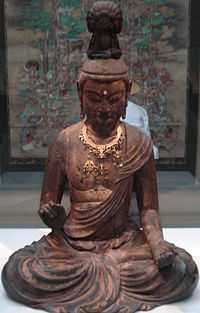Kaikei
From Wikipedia, the free encyclopedia

Kaikei, wood-colored Buddha

Kaikei, wooden bodhisattva statue with lacquer, gold, copper, and crystal
Kaikei (快慶) was a Japanese Busshi (sculptor of Buddha statue) of Kamakura period, known alongside Unkei. Because many busshi of the school have a name including kei (慶), his school is called Kei-ha (Kei school). Kaikei being also called Annami-dabutsu, his style is called Anna-miyō (Anna style) and is known to be intelligent, pictorial and delicate. Most of his works have a height of about three shaku, and there are many of his works in existence.[1]
Primary work
- Amitabha Triad in Jōdo-ji in Ono (1195) - National Treasure of Japan. Most important work. Height: 24.6 ft
- Hachiman in Tōdai-ji (1201) - National Treasure of Japan.
- Nio in Tōdai-ji (1203) - National Treasure of Japan. Joint production with Unkei et al.
- Mahamayuri in Kinpusen-ji (1200) - Important Cultural Property of Japan.
- Maitreya in Sanbō-in (1192) - Important Cultural Property of Japan.
- Vairocana in Ishiyama-dera (1194) - Important Cultural Property of Japan.
References
- ↑ "Kaikei Brief Bio". Retrieved 2012-04-30.
External links
- Bridge of dreams: the Mary Griggs Burke collection of Japanese art, a catalog from The Metropolitan Museum of Art Libraries (fully available online as PDF), which contains material on Kaikei (see index)
| Wikimedia Commons has media related to Kaikei. |
This article is issued from Wikipedia. The text is available under the Creative Commons Attribution/Share Alike; additional terms may apply for the media files.